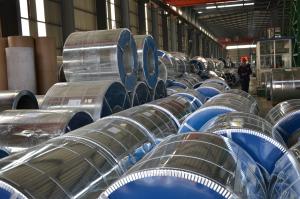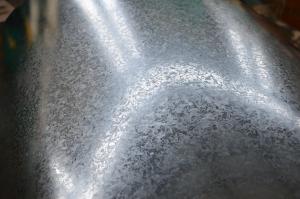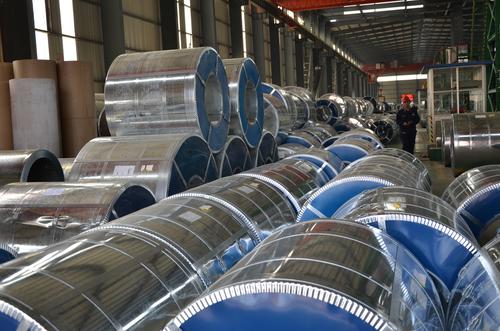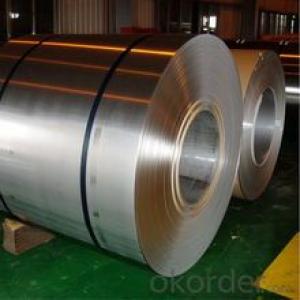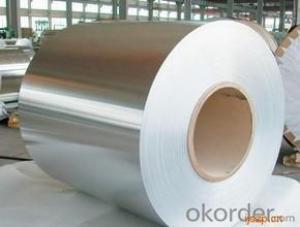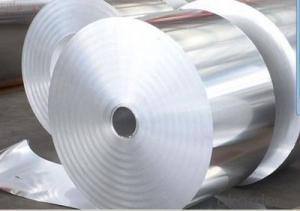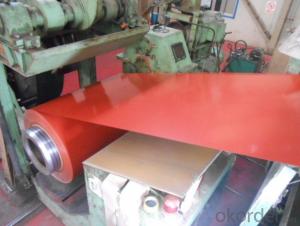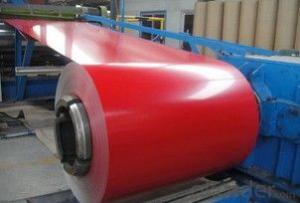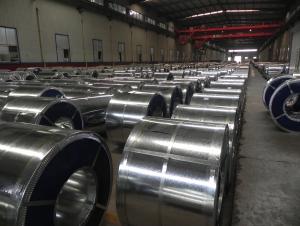galvanized steel coils
- Loading Port:
- China Main Port
- Payment Terms:
- TT OR LC
- Min Order Qty:
- -
- Supply Capability:
- -
OKorder Service Pledge
OKorder Financial Service
You Might Also Like
1) Quality Standard & Grade: JIS G3302, SGCC / ASTM 653M CQ/ EN10142 DX51D+Z
2) Thikness tolerance: +/-0.02mm Width tolerance:+/0.02mm
3) Zinc coating weight: 50g/m2
4) WEIGHT OF PER COIL: 3-5MT
5)Technology: cold rolled
6) Surface of Product: regular spangle / big spangle/ small spangle; Surface Treatment: chromated , non oiled, skin passed
7) Packing: export standard packing,packed with moisture resistant paper and metal
wrapping,securely tied for export,on metal skids7) Country of Origin :
SIZE:0.13*750
- Q: How are steel coils protected against scratches and damage?
- Steel coils are protected against scratches and damage through various methods such as applying protective coatings, using edge protectors, securely packaging them with appropriate materials, and ensuring careful handling during transportation and storage.
- Q: Are steel buildings or homes better then wooden buildings? Why?
- Arch steel buildings are extremely easy to put up as compared to other conventional structures you don't need any type of heavy equipment to erect your steel arch buildings. Most of the people put their steel buildings up with the help of family or friends in just a couple of days.
- Q: The strip tower height
- Causes: the strip has a larger snake shape; the take-up device holds the tension; the setting is unreasonable; the strip goes into the coiler; the centering is not good; the coil tension is not set properly.
- Q: How are steel coils used in the production of electrical wiring?
- Steel coils are used in the production of electrical wiring as a core material for the conductors. The steel coils are typically shaped into a cylindrical form and coated with an insulating material. This helps in providing structural support to the wiring and also enhances its conductivity and durability.
- Q: Two different shaving razors I'm looking to buy have different specs. in terms of the metals used for the blade; one being 1045 surgical stainless steel, the other 440 stainless (not sure if its A B or C, but probably 440A or 440B because it's not specified). So which one is better for the intended use as a shaving razor?
- Type 440 combines such a high grade of cutlery steel, toughness and economy that it is actually known as razor blade steel. Browsing around (a lot) more, it seems that 1045 Surgical Steel is popular in straight razors used by barbers. These razors are honed by stropping with leather and last practically forever. From the above, I would guess that it might be easier to lose the edge on 1045, but also easier to re-sharpen it, that it won't easily knick because probably not so hard as 440. I'm not sure if it would be more expensive, unless it has a superior handle etc. So, I would expect to spend a little more effort over the lifetime of the 1045, maybe pay a little more for it, but have a longer lifetime. hth.
- Q: Steel steps steel guard rail steel chair. You see where I'm going with this.
- Lex Luger's right elbow... OH YESH!!!! I SEE WERE YOU ARE GOING WITH THIS!!!
- Q: How are steel coils measured?
- Steel coils are typically measured by their weight, length, width, and thickness. The weight is usually expressed in tons or kilograms, while the dimensions are measured in inches or millimeters.
- Q: How are steel coils used in the manufacturing of conveyor belts?
- Steel coils are used in the manufacturing of conveyor belts as they provide strength, durability, and flexibility to the belt structure. These coils are typically used as reinforcements or as the core material to enhance the belt's load-bearing capacity and resistance to tension and impact. By incorporating steel coils, conveyor belts can effectively transport heavy materials over long distances while maintaining stability and longevity.
- Q: Where can I find a great deal online for Danesco Stainless Steel Egg Poacher
- looks like Target is going to be your best bet for about $35
- Q: What is the material of steel coil 08F and what brand can be used instead?
- The high quality carbon structural steel, carbon steel, steel commonly referred to as. Steel for the manufacture of parts for various machines.1.08 and 08F steel is used for rolling thin plates, deep drawing products, oil drums and high-grade enamel products. It can also be used for the manufacture of pipes, gaskets and core parts with low strength requirements, carburizing and cyaniding parts, welding electrodes and so on.2.10 and 10F steel, use cold pressing deep drawing products below 4mm, such as deep drawing vessel and shell. It can also make boiler tubes, oil drum covers and steel strips, steel wires, welding pieces and mechanical parts.3.15 and 15F steel are used to make carburizing parts, fastening parts, die forging parts and low load parts without heat treatment, such as bolts, screws, flanges and storage tanks for chemical machinery, steam boilers, etc..
Send your message to us
galvanized steel coils
- Loading Port:
- China Main Port
- Payment Terms:
- TT OR LC
- Min Order Qty:
- -
- Supply Capability:
- -
OKorder Service Pledge
OKorder Financial Service
Similar products
Hot products
Hot Searches
Related keywords
